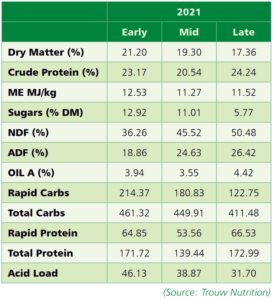A relatively mild winter and some dry hot weather in March have provided some healthy grazing covers, and whilst a cold snap has slowed growth, the opportunity for a good turnout will be a welcome relief for many systems. Despite the seasonal variation, the same issues arise, and these must be managed early to drive performance at grass. Early season pastures (previous season results to right) are often dryer than expected, which is great news for intakes, the higher proteins could drive up milk urea’s, but the real concern is rumen health and milk fats.
Fresh grass is of fantastic quality and if last season’s early ME levels of 12.53MJ/kg DM are repeated this year then, utilising this will be key. But ME is a prediction and can only be achieved when rumen function is optimal, and the feed is held in the rumen long enough to be broken down. Last year’s sugars, rapidly degradable carbs and acid load are all high, so supplementation must reflect this, and it must be done early to prevent rather than cure
At grass, healthy rumen function and reducing the inevitable butterfat drop are focused around 4 key areas.
- Fibre quantity and rumen pH – Grass of course contains fibre, but additional fibre through supplementation may still be required to provide enough nutrients for rumen bacteria. Butterfat producing bacteria require fibre but they also require a higher rumen pH and time to break the nutrients down.
- Rumen retention time – Similar to the note above, bacteria need enough time to digest the nutrients and create the relevant acids. Cows will often have loose dung at grass but if this gets excessively loose then butterfats and milk yield will be challenged. Again, managing fibre intake and rumen pH will be essential.
- Oil – The type of oil supplied in the grass is high quality, good for yields and fertility but acts negatively against milk fats. There is little that can be done about this but be aware of other oil supplements or feeds high in oil that may exacerbate the problem.
- Heat Stress – It happens every year and has a material effect on our stock. Ensuring energy intakes remain high will help but buffering the rumen to a higher level than normal is required. This will reduce stress, but it must be applied early and now is that time.
Summary
Early season grazing can only be utilised by a healthy rumen and stress-free cow, which is achieved by balancing the diet before the event occurs. NWF Agriculture through experience and research can offer the correct solution to drive productivity this season.
For more information and advice on grazing, please speak to your NWF Sales Specialist, view our weekly forage updates or get in touch on 0800 756 2787

